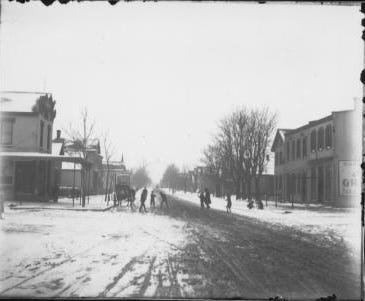Boy Groom, Girl Bride
Fervent Beginning and Tragic End - Part 1
On Thursday, May 8 of 1913, Gordon Roy and Mildred Ellis entered the clerk’s office in Evansville, Indiana to obtain a marriage license. The bubbly pair were accompanied by Mrs. Nellie Hays, Mildred’s sister, who had recently married the previous December.
The giddy couple stepped up to the counter and requested a marriage license from Miss Bessie Pelz, the Clerk’s Assistant. Bessie laughed at the request because, “Miss Ellis’s skirts were a bit short and she looked decidedly school-girlish.” The hemline of Mildred’s dress was described as about three inches shorter than older girls and women typically wore. Bessie took this as an indication of Mildred’s youth. Miss Pelz described the potential bride as “a pretty, brown-eyed girl, and she didn’t look more than 11.”
While Mildred was being assessed by Miss Pelz, an argument began between Gordon and Clerk Wilson who was saying, “She looks mighty young to me…” During this discussion, Mr. Wilson realized he’d heard Gordon Roy’s name before. He scanned his memorandum book and found he’d made a note a few days prior after taking a phone call from Andrew Roy, Gordon’s guardian. Andrew explained that his nephew might be coming to the office to get a marriage license and requested that one not be issued. Mr. Wilson denied the license.
The local newspapers scooped this ball right up, ran all the way down the field, and beyond. One Evansville headline read, “Kentucky Cupid winks at Short Skirt.”
Documents don’t specify the source of the following information, whether from Andrew Roy (which is most probable) or elsewhere, but Clerk Wilson had been informed that Gordon was 17 years old, but Mildred was only 14. Gordon’s age seems to be correct based on census documentation. However, Mildred’s age is supported by documentation as being 18 at the time.
The 1900 census gives Mildred’s birthdate as November of 1894 and her age as 5 in June of 1900. In 1910, she is stated as being 15 years old in May, which is consistent and would mean on her birthday in those years, she would have turned 6 and 16, respectively. In March of 1913, she would have been 18, having not yet had her birthday that year.
There could be any number of reasons why Mildred’s age was thought to be five years younger than it was. Perhaps Andrew, or even a family friend living in Evansville, had seen Mildred and Gordon together and had the same reaction to her age. If anyone asked her age, they may have not believed her. Someone must have contacted Gordon’s mother Rosa Roy, who lived in Nashville, Tennessee, to report that her son was courting a prospective bride who was much younger than Mildred actually was. At any rate, the result was that Andrew called ahead to forewarn the Clerk in hopes of foiling the impending marriage.
Newspapers of the time can be and frequently are wrong about many things, especially juicy relationship details like this. For instance, it was printed more than once that Mildred’s father was the Mayor of Grayville, Illinois when this happened. Maybe Charles Ellis had been Mayor there at some point, but census records for 1880 record him as a plasterer in Grayville; in 1900 a landlord for “Billion Co.” in Patoka, Indiana; in 1910 he was back to being a plasterer in Grayville; and by 1920 he was widowered and had moved to San Diego, California where his eldest daughter Blanche was living, having married, moved, and been widowed.
Per the city directory for Evansville, in 1913, Charles Ellis lived in Evansville and was a Foreman at Ferdinand Funke Sons, a wholesale hosiery and notions company. This doesn’t mean he could not have served as Mayor of Grayville as often those filling that public office also had other jobs, but I can find no evidence of him as Mayor. He could have served as Mayor around 1910 when he was living there once again, but he didn’t live in Grayville in 1913.
After being turned away in Evansville, the trio crossed a couple of downtown streets and hopped aboard a train to make the short trip across the Ohio River to Henderson, Kentucky. The clerk at the Henderson courthouse didn’t refuse them, but did say he needed permission for Mildred whose youthful visage kindled the same suspicion as it had in Miss Pelz and Mr. Wilson. Consent was provided by Mildred’s sister and was accepted. Nellie was four years older than Mildred, not anywhere near enough to appear to be her mother but it could be that Nellie vouched for Mildred’s age of 18 and that was enough.
The coveted marriage license was successfully obtained and the smitten lovebirds were promptly hitched. The paper reported the couple were to depart on Sunday, May 11 for Atlanta, Georgia and Jacksonville, Florida for their honeymoon before traveling to Nashville, Tennessee to live. Nashville is where Gordon was born and where his mother still lived.
Gordon and Mildred had known each other for only two weeks. They developed a “real case of love at first sight” upon meeting for the first time and saw each other six times total before deciding they wanted to marry.
Headlines like “Boy Groom and Girl Bride” and “Child Couple Not Going to Separate” hit the front of every local newspaper.
Had it not been for Andrew Roy’s call requesting a license not be issued for his ward, it probably would have been granted in Indiana. For females and males, the age of consent for marriage in 1913 in both Indiana and Kentucky was 12! Based on this, both applicants were considered of age in both states, even with Mildred’s incorrect age of 14, but the Clerk in Evansville abided by the request of Gordon’s guardian. The Clerk in Henderson, Kentucky may have done the same, but had not been contacted about Gordon.
Legislative reform in 1920 raised the age of consent to 16. The age of consent for marriage is now 18 in both states with the provision in Kentucky that a 16- or 17-year old can marry with permission from at least one parent if the parents are married, or from both parents if they are not.
The honeymoon they were said to have taken, if they did, certainly would have been financed by someone. It’s doubtful Gordon’s mother, Rosa, would have done so as she was a widow with three children still at home ranging from age 6 to 15, and most likely was not in favor of the marriage to begin with since Andrew Roy, a family member, was opposed enough to call the Clerk’s office with a warning. Judging by Rosa Roy’s later actions, it’s highly unlikely she was at all pleased. The father of the bride, Charles Ellis, may have had no objection or at least figured it was too late for objections and decided to just make the best of it. The other option is that this was a fanciful story that never was going to happen.
I have to wonder if they went on a honeymoon of any sort. It just doesn’t seem probable. Aside from the intended distant honeymoon locales, the couple’s plan to live in Nashville also never happened, and that again could be due to Rosa’s disapproval. Regardless of her opinion of the marriage, she likely was not willing or able to house and support the unemployed couple. I don’t have documentation explaining why Gordon moved to Evansville alone other than he went to his Uncle Andrew with the intention of getting a job and striking out on his own. Adding to his mother’s inevitable worry about her son, far from home for the first time, the sudden addition of a wife, completely unknown to Rosa, probably only added to her anxiety.
Mr. and Mrs. Roy were in Evansville the weekend of May 17-18, whether they had a honeymoon or not. The couple was interviewed at their home on E. Franklin Street on Saturday. They were told that friends had been spreading the story their marital bliss had already foundered and that Mildred was going to leave Gordon. She laughed and replied, “Going to part, indeed! Well, hardly, I wouldn’t leave him.” She wrapped her arms around Gordon’s waist and called him ‘dear.’
Gordon’s reply was that he and Mildred had a few little spats and she had threatened to leave, “but she’s never done it.” It had been nine days since their marriage.
Their apartment was described as a “dovecove” (probably a misprint of dovecote) of one room above a grocery store. It was noted to have enjoyed only the lightest of light housekeeping. Mrs. Roy cheerfully disclosed that she had rapidly tired of it.
Another rumor said to come from Mildred’s friends was that Mildred told an older adult that Gordon wasn’t the ideal man she thought he was, saying, “I wanted him horribly before we were married. But now that I’ve got him, I find that I don’t want him so much.”
How much truth is in this statement, I don’t know, but I’m feeling sad for Gordon at this point, and that may be because I know what is going to happen.
I can’t help wondering how much of this story is entertainment fluff because this same article restates that Mildred’s father was Mayor of Grayville and additionally claims her three brothers are “physicians and lawyers” in Grayville. Census records show otherwise.
Her eldest brother, Frederick, probably had the most stable and profitable work life. In 1910, he was a plasterer, as was his father, in Grayville before he moved to Chicago and worked as a beverage company salesman, then manager of an ice cream store. As the decades passed, Frederick became a Business Agent for a labor union and then Secretary Treasurer for the same organization. His home was the third and uppermost floor of a lovely building on Sunnyside Avenue in Chicago.
Mildred’s younger twin brothers, Ralph and Raymond, held various jobs over the decades, in several states, including farm help, fruit picking, and the military. They died within a month of each other in 1962 in Oroville, California.
This tale of two young people dazzled by love at first sight and a hasty marriage might appear to be the main story here, but it is only the start of it. Three months later, in August, the papers were again buzzing about the young couple. This time, the news was not light-hearted.
Their story will continue in Part 2.











Cynthia, I can't believe you kept us hanging!! Looking forward to hearing the rest of the story.
As I read some of the quotes from the couple, all I can think of is "ignorance is bliss" Aah, to be young. That said, it sounds like we're about to hear about dark turn in their relationship. I'm looking forward to learning what happens.